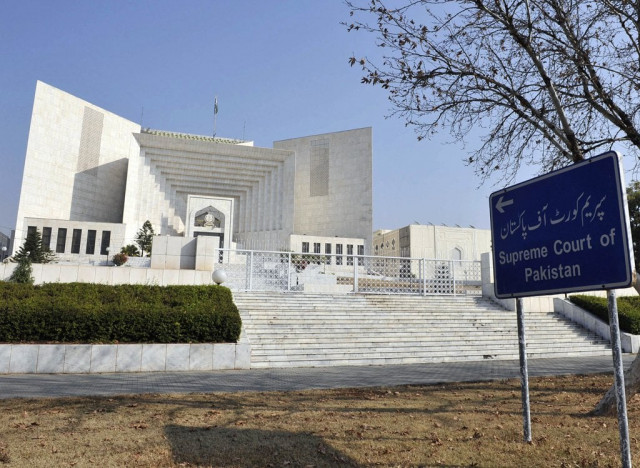SC seeks evidence details of 73 military court convicts
Three-member bench also seeks evidence details of those acquitted by military courts

The Supreme Court of Pakistan. PHOTO: AFP/File
A three-judge bench, led by Justice Mushir Alam and comprising Justice Munib Akhtar and Justice Amin-ud-Din Khan, resumed hearing of the defence ministry’s plea against an earlier Peshawar High Court (PHC) decision of acquitting the convicts.
A two-member bench headed by Justice Sheikh Azmat Saeed had suspended the PHC verdict against military court convictions while hearing the same plea in November 2018.
Today’s hearing
Additional Attorney General Sajid Illyas Bhatti said the military courts have a standard trial procedure that also allows the convicts to challenge the decision. He emphasised that the military court verdicts were in line with the Criminal Procedure Code (CrPC).
When Justice Alam inquired about the crimes committed by the convicts, the additional attorney general replied that all 73 of them were sentenced in different cases.
Bhatti lamented that the PHC sidelined the Constitution and reality when acquitting the 73 military court convicts. He added the military courts had also acquitted convicts. “At least five suspects were let go due to lack of evidence.”
Justice Akhtar noted that a first information report (FIR) and a confession was not enough evidence. He said a confession made before an army personnel holds no value since the statement can only be recorded before a magistrate.
The additional attorney general said confessions led to verdicts during the trial and statements were recorded from officers at the detention centres.
Justice Akhtar remarked that on prima facie, there was no evidence other than a confession. Bhatti said the investigation officers attained information from the convicts.
Meanwhile a counsel representing one of the convicts lamented that his client was provided unsatisfactory legal assistance. He claimed the suspects remain unaware of the counsel fighting their case.
He was arrested from Islamabad in 2012 and presented after five years with a confession. A petition was filed over his abduction in the top court.”
The additional attorney general requested the top court to consider it as special circumstance since witnesses were reluctant to record statements against terrorists.
He added the Parliament had constituted military courts keeping this reality in view and said Article 10(a) did not apply to military courts.
Artilce 10(a) Right to fair trial: For the determination of his civil rights and obligations or in any criminal charge against him a person shall be entitled to a fair trial and due process.
The counsel for one of the convicts requested the apex court to review if the Pakistan Army Act 1952 was superior to the Consitution.
The additional attorney general informed the top court that the PHC decision was due tomorrow on 200 appeals against the military court convictions and pleased to the the bench to prevent the high court.
However, Justice Akhtar remarked that the high court could not be stopped from announcing a decision.
The apex court sought details of the evidence against the 73 convicts and those acquitted by the military court as well, and adjourned the hearing till tomorrow.
The PHC verdict
The October 2018 PHC verdict authored by Justice Waqar Ahmad Seth and Justice Lal Jan Khattak was presented by Pakistan as evidence before the International Court of Justice in the Kulbhushan Jhadav case against India to assert the military court's convictions were reviewed by superior courts.
It was on the basis of this verdict that the ICJ did not set aside the trial of Jhadav.
The PHC verdict was announced after three-day-long detailed arguments in an in-camera hearing.
There were a total of 74 appeals on the cause list against the military court’s convictions and the majority of them of capital punishment. In addition, there were also cases of life imprisonment and sentences of up to 20 years in jail.
In the detailed judgment, the bench rejected confessional statements of all convicts by elaborately discussing the flaws in them. It also discussed whether the right to a fair trial under Article 10-A of the Constitution was extended to the convicts.
The bench observed that the entire judicial confessional statements recorded in Urdu were ‘in one and the same handwriting and in one specific tone/style’.
“It is admitted at the bar that for Khyber Pakhtunkhwa there were in all three Field General Court Martial courts and each and every document on file would show that all the three courts were functioning on one and the same pattern, not even a single accused has deviated differently to the questions put to him,” it pointed out.
The bench said the questions put to all accused were same with exactly the same answers in all cases also for the purpose of engaging a private counsel “The same format would reflect there were planned proceedings in all the said three courts.”
“It is observed from the record, so produced that they have erased each and every date, the names of the prosecution’s witnesses, their designations, and many other things.



















COMMENTS
Comments are moderated and generally will be posted if they are on-topic and not abusive.
For more information, please see our Comments FAQ